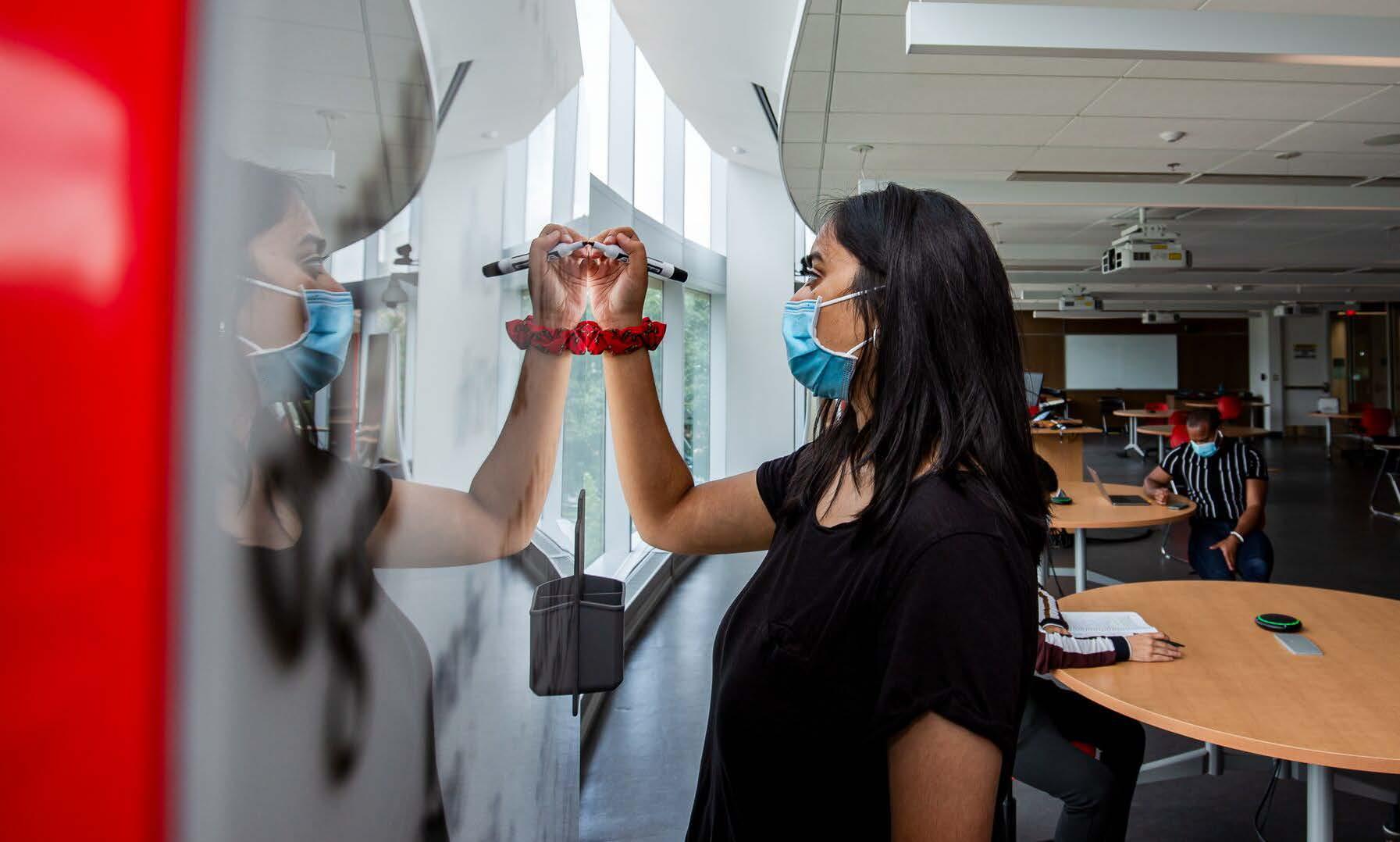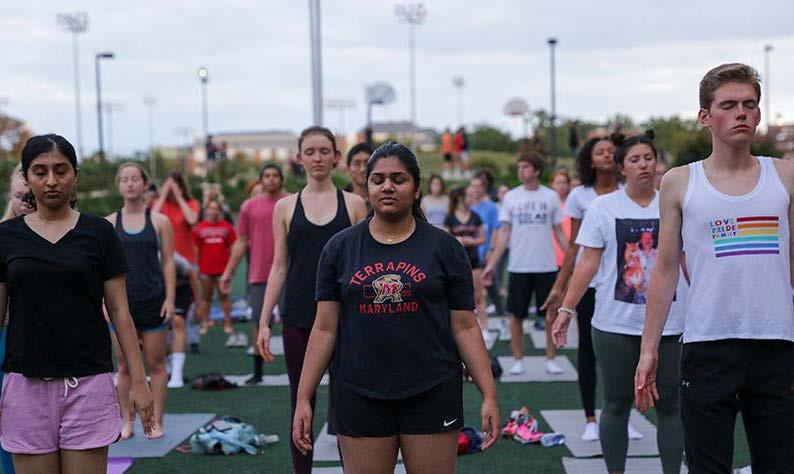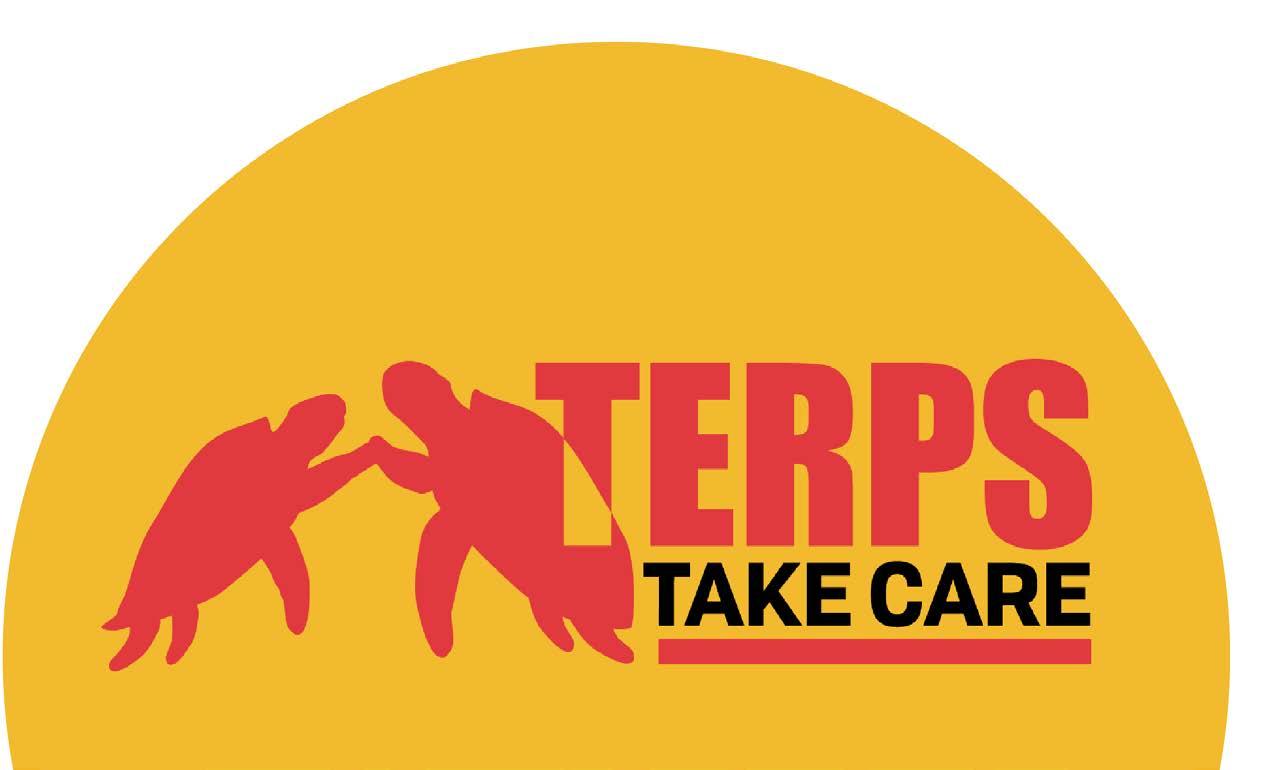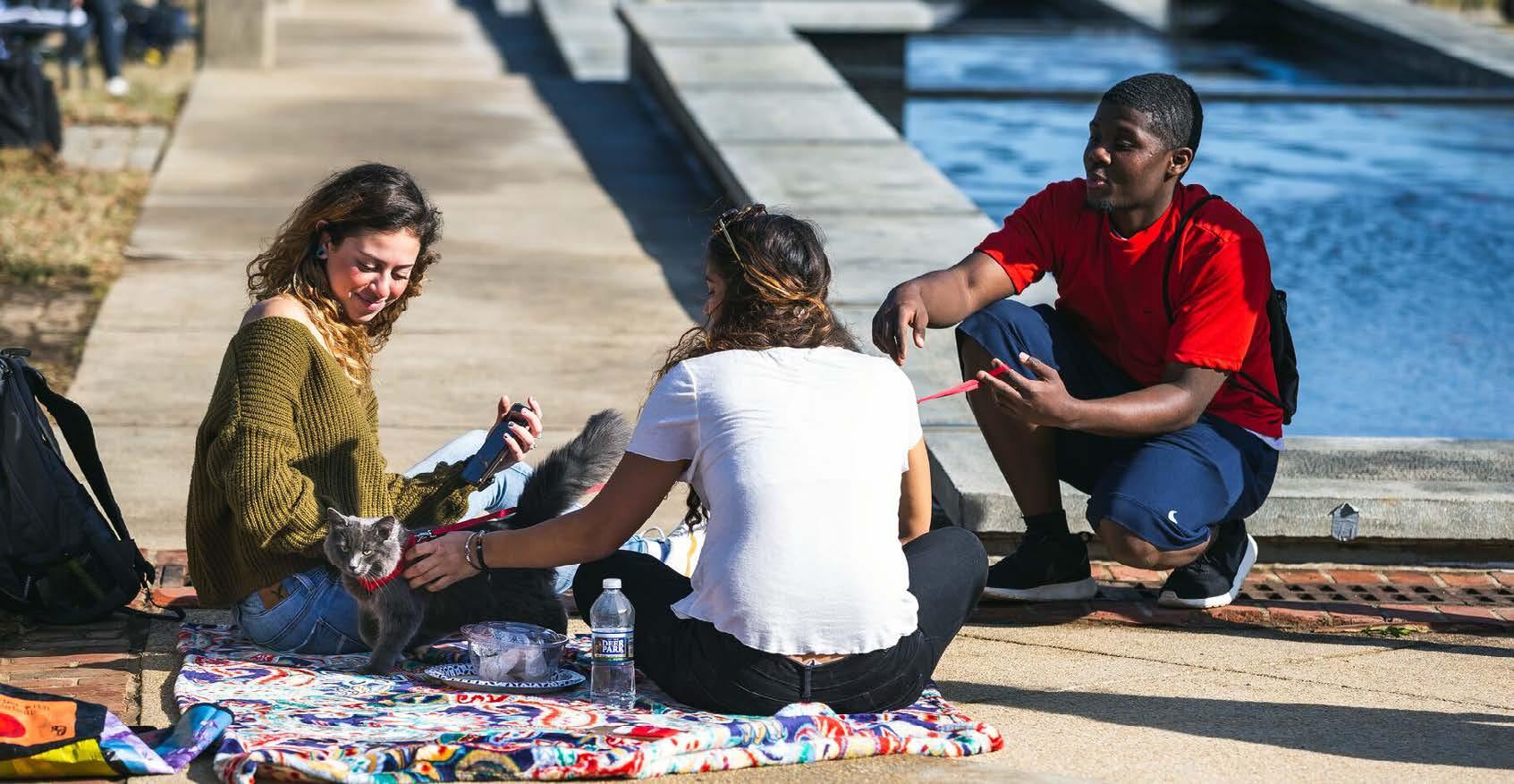ACADEMIC SUCCESS GUIDE
RESIDENT LIFE | Fall 2022
Dear Terps,
You have achieved so much this fall! You may have made new friends, studied a new subject, found a new passion, or discovered a new resource. While there have likely been some challenges, you have also undoubtedly had some successes as well. Take a moment to honor your successes, accomplishments, and what you have learned about yourself this semester. We are proud of the progress you have made this semester!
For this final stretch of the semester, we’ve compiled helpful tips, strategies, and resources to help you be successful in your final exams and projects. We are always here to help you succeed!

The Department of Resident Life wishes you success in your final exams and a restful break!

Tips for Success

2
EXAM PREPARATION
Preparing for a final exam can be daunting whether this is your first or your tenth final. Finals preparation is a process that happens over time. You should be preparing for exams every day. Space out your studying and utilize different preparation techniques to achieve success.
If you are unsure where to start in your finals preparation, here are some questions to ask your professor:
1. How many questions will be on the exam?
2. What types of questions will be on the exam?
3. What material will be covered?
4. How much will the exam count toward the final grade?
5. Will the questions come primarily from the notes or the text?
6. Will partial credit be awarded for some answers?
7. How much time will we have for the exam?
8. Will there be any extra credit?
9. What materials (books, notes, calculators, and so on) will we be able to use?
10. What outside material (handouts, readings, etc.) will be included on the exams?
Your professor will know the answers to these questions, but these answers may also be found in your class syllabus.
Your class syllabus is also a great tool to help get you prepared for finals. The syllabus will outline the important themes and topics that were covered in the class. Those themes and topics can become the skeleton of your study guide.
SUCCESS
Confucius
3
ISN’T OVERNIGHT. IT’S WHEN EVERY DAY YOU GET A LITTLE BETTER THAN THE DAY BEFORE. IT ALL ADDS UP.”
-Dwayne Johnson, actor and former wrestler
IT DOES NOT MATTER HOW SLOWLY YOU GO AS LONG AS YOU DO NOT STOP.”
DICTIONARY OF EXAM TERMS
There may be terms on your exam that might be new to you. Here is a list of common exam terms and what they mean.
• Analyze: break the topic into its separate parts and write about (discuss, examine, or interpret) each one.
• Criticize: evaluate the positive and negative effects of what is being discussed.
• Define: provide the exact meaning of a word, concept, etc.
• Describe: make the topic clear by giving the major details and supporting facts.
• Discuss: consider and debate or argue the pros and cons of an issue.
• Enumerate/list : recall and specify items in the form of a list.
• Evaluate: give your opinion about the value or worth of something; include supporting evidence.
• Explain: make an idea clear; show how a concept is developed or give reason for an occurrence.
• Illustrate: explain by giving concrete examples.
• Interpret : clarify the meaning or paraphrase the information; comment upon, give examples, describe relationships, explain the meaning (describe & evaluate).
• Justify: explain the purpose behind or reasons for a statement.
• Outline: describe the main ideas or points.
• Prove: use evidence and arguments to support assertion.
• Relate: reveal connections between subjects or ideas, often by putting the subject into a larger context.
• State: explain precisely.
• Summarize: give a condensed account without unnecessary details.
• Trace: show the development, history, order, or progress of a subject or event (often by showing cause and effect).
*Content adapted from Hamline University’s Questions to Ask Before an Exam.
4
WHAT DO I NEED TO CREATE AN EXAM PREPARATION PLAN?
Ask yourself these questions to create an exam preparation plan:
• What type of final exam is it (e.g., multiple choice questions, short-answer, essay, true/false questions)?
• What is the date of the exam?
• How much time is needed to prepare for each final assignment?
• What classes or topics do you feel comfortable with?
• What classes or topics might you need to spend more time with?
These questions can help you determine how much time you should spend on preparing for each subject.
• What materials will you need to successfully prepare for each final exam or assignment? This could be supplies like highlighters and flashcards, or materials that are directly class-related like handouts or study guides.
• What commitments do you need to keep and what commitments can you let go during finals preparation time? Think through your priorities and what those look like. You may need to continue working during finals period, but maybe you can skip a few student club meetings.

• Set the expectation with family and friends that you will need to study hard and that you might not be able to come home on the weekends, chat on the phone for hours, or play host during a surprise visit.
Pro Tip: Schedule time in your exam preparation to socialize with friends and to practice self-care. Knowing that you will have a break will keep you motivated during periods of studying.
• What time of the day do you feel more productive? If you feel more productive in the morning, schedule the majority of your studying/finals preparation time during the morning. Continued on the next page
5
• What is your ideal study environment? Some characteristics to consider are noise level, amount of light, types of seating, amount of people, water fountains/fill station access, snacks nearby, etc. Think about what characteristics are important to you and use the Quiet Study Spaces Guide and the University Libraries’ Find A Space feature to find some study spaces on campus.

• For what classes might you need additional support? For those classes, create a study group. Use these groups to review content that you are not feeling confident about and also to cement your own learning by teaching content to others. Study groups should be made up of people in your class that represent those who are comfortable with the information presented as well as those who may struggle. Study groups should not be formed solely from your social circle. Visit go.umd.edu/caltoolkit for detailed information about how to form an effective study group.
• What is going to motivate you to study and prepare for finals exams? It may be helpful to set up personal accountability measures for yourself. Will you spend 90 minutes in the library each day? Will you complete non-final exam assignments by a certain date so you can get a jump-start on preparing for finals? Will you set up study dates with friends to ensure you get work done? Decide what will work best for you and make a commitment.
6
STRATEGIES FOR SUCCESSFUL STUDY
• Study the test content like you will need to teach it, then actually teach the content to a friend, pet, or stuffed animal.
• Utilize your time effectively by not letting your mind wander while reading. Skim a section or read the first sentence of each paragraph before reading all the way through. You should also take notes while reading.
• Do not skip over charts or practice problems in your textbooks. Always review this data and practice as you go along. This will help your brain learn incrementally, save time, and eliminate the need to review content multiple times when completing problems at the end of a chapter.
• When writing a paper, determine the flow of your paper ahead of time. Outlines can be as simple as writing down the topic for each paragraph or can go deeper and include specific points, quotes, and citations. The better and more thorough your outline, the easier it will be to write your paper.
• If you are beginning a project, break it down into manageable pieces and assign due dates to each. Treat the pieces as individual assignments and hold yourself accountable to finishing on time.
• Group projects can be difficult. Try to move away from assigning pieces of the project to group members and then working separately. Work together to determine which points should be covered in each person’s piece of the project, effectively leaving the simple, non-content development pieces to be done independently.
• Study to learn and understand content, not to get a certain grade. Many of your classes are helping you to build foundational knowledge that will be needed in coursework down the road. Studying to understand now will help you in classes and on finals in your future classes.
Pro Tip: Double check the time and location of all of your finals as well as the due dates and drop off locations for papers and assignments. Do not let yourself be caught off guard.
7
IT
-Nelson Mandela
SUCCESS IS ITS OWN REWARD, BUT FAILURE IS A GREAT TEACHER TOO, AND NOT TO BE FEARED.”

 -Sonia Sotomayor
-Sonia Sotomayor
8
ALWAYS SEEMS IMPOSSIBLE UNTIL IT’S DONE.”
IMPOSTOR SYNDROME
Have you ever felt like you are just faking your way through a course or that you are not smart enough to be a student at the University of Maryland? A lot of high performing people feel similarly. Impostor Syndrome is a “state of mind where a person does not feel deserving of their accomplishments and credentials and consistently worries about being exposed as a fraud.” While this can encourage a person to work harder, it can also increase a person’s stress levels, and during final exams, it can lead a person to self-sabotage. Did you know that studies have shown that 70% of people report having experienced Impostor Syndrome during their life?

• Mechanisms to Cope with Impostor Syndrome:
• Identify and recognize that you are having these feelings.
• Find someone who agrees that you may be experiencing Impostor Syndrome and talk about it.
• Accept praise and say, “thank you.” Downplaying success to others will minimize accomplishments in your own mind.
• Call yourself out internally when you compare yourself to others. Compete with yourself, not those surrounding you.
• Do not allow yourself to breach the Code of Academic Integrity. It is important to relay information that you know to be true. If you do not know an answer, put in the proper work to find the answer and give proper credit to the source.
9
Staying Healthy During Finals

10
WELLNESS
Wellness plays a large role in academic success and impacts your ability to be successful. Here are some wellness tips that may be beneficial for you as you prepare for finals, but also for life as a student in general.
FOOD & DIET
Handling stress and anxiety is easier if your body is healthy. One way of keeping your body healthy is being mindful of what you are eating.
• Eat breakfast . Start your day off right with a good meal when you get up. Whether you’re rolling out of bed at noon or up at the crack of dawn for class, make sure you start your day with a balanced, healthy meal.
• Keep healthy snacks around . It’s easy to eat healthy if you keep the Cheetos at bay and stock your room with fruits and other healthy snacks. You’ll be more likely to reach for these rather than junk food if you keep them nearby or in your backpack.
• Drink water. Drinking enough water can help boost your concentration. Make sure to keep hydrated as you go through your day by bringing water with you.
• Try to eat fruits and veggies. Even if fruits and vegetables don’t comprise some of your favorite foods, try to incorporate at least a few of them into your diet each day.
• Don’t skip meals. With so much to do, it’s easy to forgo eating in order to get to class or the library. Don’t skip meals. Set up foods you can eat on the go so you’ll have the energy to keep going.
11
EXERCISE
Fitting exercise into a busy schedule isn’t always the easiest thing, but take stock of some of these tips to help you get or stay on track to fitness.
• Play a sport . One way to get yourself motivated to exercise is to make it a game by playing a sport. Join an intramural team or play recreational sports to get active and have fun at the same time. Whatever sport you play, be sure to use the proper safety equipment to avoid injury.
• Head to the gym . Use of RecWell facilities is included in your student fees so why not take advantage! Head to the gym between classes or when you get up in the morning to squeeze in a workout.
• Take advantage of fitness courses. Along with gym facilities, RecWell also offers fitness classes that you can take. Since you’re already paying for these through your student fees you may as well attend a class and get a workout that will help keep you in shape and motivate you.
• Take advantage of open spaces. UMD is an arboretum and has lots of nice outdoor areas. Take advantage of these spaces to take hikes, play frisbee, or just walk around. Why not make it more fun by bringing a friend?

12
College students aren’t exactly known for their early to bed–early to rise attitudes, but getting sleep is an integral part of staying healthy. Check out these tips to help you make sure you’re resting enough.
• Take a nap. If you have the time during the day, a short nap can do wonders for your energy levels. Just make sure not to nap too close to bedtime or for too long.
• Don’t work in bed . Working in bed can make getting to sleep harder. Keep your work space separate from your sleep space to keep insomnia at bay.
• Get a full night’s rest whenever possible. While the amount of sleep each person needs varies, most people need 7-9 hours to feel fully rested. While this may not be possible every night, try to sleep a full night whenever you get the chance.
• Stick to a schedule. With different classes and work hours each day, it can be hard to stick to a schedule, but keeping sleep times similar from day to day can greatly improve your chances of getting a good night’s sleep.
• Understand that lack of sleep can have a big impact . Lack of sleep doesn’t just make you cranky, it can also reduce your ability to concentrate and to excel at class, so try to get as much sleep as you need.
• Work out bedtimes with roommates. When sharing a room with someone it can be hard to go to bed when you need to and not get woken up when you don’t want to. Try to work with your roommates to make sure you each get the sleep you need.
• Avoid all nighters. While you may feel like you need to study all night to do well, you might be doing yourself a disservice. Not getting enough sleep can impair your ability to do well in your classes, regardless of how much you’ve studied, so make sure you get at least a little sleep before your big test.

• Create a bedtime routine. If you have trouble falling asleep at night, you can help yourself by creating a routine that will let your mind and body know that bedtime is approaching and that it should get into sleep mode. After a few weeks of practice this should help you fall asleep when you need to.
• Avoid caffeine, eating, and drinking right before bed . All of these activities can throw off your body’s internal clock, so try to limit meals, alcohol, and caffeine consumption to a few hours before bed.
• Keep your room dark and quiet . While college campuses are hardly either, try to keep your room as dark, quiet, and cool as possible. This will help trigger to your body that it’s time for bed and help you get and stay asleep.
13 SLEEP
ILLNESS
With communal living and thousands of other students sharing classroom space, spreading colds and viruses is easy if you’re not careful. These tips can help keep you from getting sick.
• Wash your hands. Studies have shown that simple hand washing can help prevent a large number of illnesses. So wash your hands, especially any time you’ll be touching your nose, mouth, or eyes, or if you’ve been around others who are sick.
• Avoid sharing beverages. Germs are easily spread through the sharing of drinks, alcoholic or otherwise, so get your own and avoid sharing with friends.
• Don’t go to class. If you’re sick, don’t force yourself to go to class. It will only make you feel worse and infect other students. Email your professors that you’re ill and stay home and rest.
• Get to the doctor. If you have symptoms that aren’t showing any signs of clearing up within a few days, you may need to take a trip to the University Health Center or your doctor.
• Drink lots of fluids. Colds and flu can wreak havoc on your body, often depriving it of much-needed fluids. Replenish these by drinking plenty of water or energy drinks when you’re ill.
• Get a flu shot . With so many germs around, sometimes getting a flu shot is the best thing you can do to avoid getting sick.
• Avoid ill friends. If your friend is sick, try to avoid spending too much time around them. While bringing soup or medications won’t hurt, interacting with ill friends and their stuff can increase your chances of getting sick yourself.
• Don’t touch your eyes, nose, or mouth . If your hands aren’t totally clean, try to avoid touching these areas. The membranes in these areas make it easy for bacteria and viruses to enter your body.

14
STRESS
Students can get run down with so much going on. These tips can help you beat the stress.

• Create a routine. If you get yourself in the habit of studying, working out, and sleeping at certain hours, it will be easier to fit in all the things you need to do in a day without feeling too stressed out.
• Put limits on work hours and give yourself a break . You can’t work all the time—fun and relaxation have to be part of your routine as well. Limit the times when you will work to give yourself time to sleep and rest up so you won’t get sick or stressed out.
• Be realistic . Sometimes there’s just no way you’re going to get everything done in one day. Be realistic about your goals and understand that you can only do so much.
• Understand you can’t do everything . While you might want to go to class, work, play a sport, and participate in clubs and social activities, the reality is that sooner or later you’re going to get run down by trying to do so much. Focus on doing the things you truly love and forget about the rest during finals season.
• Cut back if needed and get help. If you’re feeling like you’ve got too much on your plate, cut back on work hours or extracurricular activities to make your schedule more manageable.
• Take advantage of campus meditation and yoga programs. RecWell offers various yoga classes throughout the week and the University Health Center offers meditation sessions that can help students get a release from their stresses through a relaxing session of meditation.
• Relax with hobbies. Whether you like to paint or to destroy aliens with your friends in video games, making time for the things you love is an important part of keeping yourself from getting too stressed out.
• Give yourself plenty of time. It’s easy to put off starting on a big project or studying for a test until the last minute. You’ll be much less stressed out, however, and will likely do better, if you give yourself more time to work on it.
• Spend time with friends. There are few things that can cheer you up like being around the people you like most. Eat dinner with friends, hang out and watch tv, or take a walk to get away from the stress of homework and finals preparation.
• Don’t let yourself get run down . With so much to do, it’s easy to get run down. If you feel yourself getting stretched too thin, take a step back and evaluate everything you’ve got going on to determine what’s really important.
15
MENTAL HEALTH
College can be a time filled with mental health challenges. Take a look at these tips to keep yourself happy and healthy.


• Don’t let stress get the best of you . Stress can be a major factor in many students’ mood leading into final exams. If you’re feeling stressed out, make sure to take a break and set aside time to relax. If you need support dealing with your stress or mental health, seek out assistance from the Counseling Center
• Realize you don’t have to please everyone. There is no way that you can make everyone happy all the time. Concentrate on making yourself happy first and you’ll cut out lots of stress and hassle from your life. What exam results will make you happy? Focus on those results and guard your mental wellbeing.
• Build on your confidence. If you know you’re good at certain things, build on the confidence you take from these activities rather than concentrating on your faults. Being confident plays a role in how you feel going to an exam. Engage in activities that build you up.
16
RESOURCES
ACADEMIC SUCCESS & TUTORIAL SERVICES
As an initiative of the Academic Achievement Programs (AAP), the Academic Success and Tutorial Services program provides free peer tutoring to all UM students for over twenty 100- and 200-level general education courses. Additionally, tutoring is offered for historically difficult courses in areas such as biology, business, chemistry, computer science, economics, mathematics/ statistics, and physics.
THE COUNSELING CENTER
The Counseling Service in the Counseling Center is the primary campus provider of free and confidential therapy to help UMD students manage personal, social, and academic challenges. The Counseling Center also offers wellness workshops and a variety of resources to help students with common student concerns.
GUIDED STUDY SESSIONS
The Guided Study Sessions (GSS) program offers FREE, regularly scheduled group review sessions for students in traditionally difficult courses. GSS Leaders have previously taken your course and earned an A, so they know what it takes to stay on track in lectures and prepare for exams. Go once, a few times, or attend every session—it’s never too late to start attending GSS. For the Fall 2022 semester, some Guided Study Sessions will be conducted in-person and others will be conducted virtually through Zoom. To access a specific virtual session, please contact your GSS Leader or email gss@umd.edu from a University email address. Visit the GSS Schedule to view the available sessions.
KEYSTONE CENTER
Located in Patterson, the Keystone Center is a place where you can go to work on homework or group projects, use the computer labs, or study for exams. It will be staffed with upper-level undergraduate and graduate students who can provide you with assistance in answering questions in fundamental engineering and STEM courses: CHEM135, MATH140, MATH141, MATH241, and MATH246.
17
RESOURCES
LIBRARIES
The University Libraries offer plenty of resources including those for getting started on research as well as places to study. There are six libraries on campus and all have different hours. Learn more about the various libraries’ hours on their website
STUDENT LEARNING CONSULTATIONS
The Learning Specialist provides academic counseling to UMD students taking all levels of STEM courses. To schedule a time to meet with a Learning Specialist, please send an email from your UMD email account to learn@umd.edu or schedule an appointment on the Student Consultations page .
MATH SUCCESS PROGRAM
The Math Success Program offers free, drop-in math coaching and tutoring services for all UMD undergraduate students. The program is open SundayThursday from 6:00 p.m.–9:00 p.m. Sundays are virtual, and Mondays through Thursdays are held in ESJ 0224. Visit the Math Success Program website to get more information and access the program.
MATH TEST BANK
Google Drive of past exams from the Math Department for tons of classes. Great practice material for studying for exams.
Bonus tip: Keep track of academic deadlines and other important academic opportunities on campus by downloading the Academic Success Calendar.
18
RESOURCES
OFFICE OF MULTI-ETHNIC STUDENT EDUCATION (OMSE)
OMSE offers free, walk-in tutorial programs that cover most key courses in Writing, Mathematics, Biology, Chemistry, and Economics, among other courses. Individual and small group tutoring consisting of 2–4 students per group is available each semester in most undergraduate courses. Check out the OMSE tutoring schedule to see if your course is available. You can also check out short videos created by OMSE tutors on some traditionally difficult concepts.
OFFICE OF STUDENT CONDUCT
The Office of Student Conduct serves the entire UMD community by investigating referrals, enforcing the Codes, and committing to a fair, honest, and transparent conduct process. The Office of Student Conduct handles issues of academic integrity. If you are unsure of rules about academic integrity, the Office of Student Conduct has resources to assist you.
ORAL COMMUNICATIONS CENTER (OCC)
The OCC can provide: peer consulting for presentations, speeches, and other modes of oral communication; Speech planning and practice assistance; Interactive workshops on a variety of relevant communication skills; Special events and workshop series. You can schedule an appointment here
QUIET STUDY SPACES
These spaces offer some great opportunities to safely explore campus and find new places to get your work done. Please visit the Quiet Study Spaces list to view the spaces that are available, as well as the guidelines around using the spaces.
19
RESOURCES
SPS TUTORING
The Society of Physics Students (SPS) offers a free online and in-person tutoring program for anyone taking an introductory physics course at UMD. Tutoring is available on a drop-in basis through Zoom from 4-6pm, Monday through Thursday. It is also available in Toll 1303 at the same time. In order to request the Zoom information, students must fill out the following brief form: https://forms.gle/M8FnJrEDgTkwSiUR8
TUTORING & ACADEMIC SUCCESS RESOURCES
The University is committed to academic excellence, and provides a variety of tutoring and other academic resources to support student success — available on campus, from our peer institutions, and other non-university websites. To learn more about the available resources, visit tutoring.umd.edu . Also checkout these helpful resources to tackle some common academic concerns.
THE WRITING CENTER
The Writing Center provides opportunities for UMD’s diverse undergraduate student body to improve their writing, research, and critical thinking skills in preparation for successful academic, professional, and civic lives. In a supportive atmosphere, trained consultants from a variety of backgrounds and majors assist writers in-person and online throughout the writing process. Visit the Writing Center’s website to schedule an appointment.
*Some of this content has been adapted from various sources including but not limited to The Teaching and Learning Transformation Center, The Counseling Center, The UMD Keep Learning website , Rutgers University, and Hamline University.
20

luck on finals, Terps! Study hard, go to class, get enough sleep and ask for help when needed. You’ve got this! reslife.umd.edu/safety-resources/academic-success
Good







 -Sonia Sotomayor
-Sonia Sotomayor








